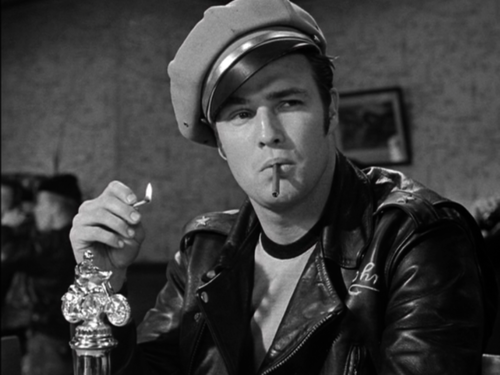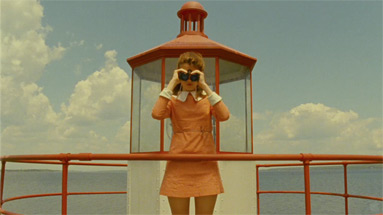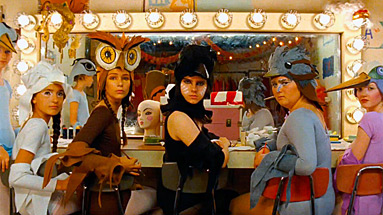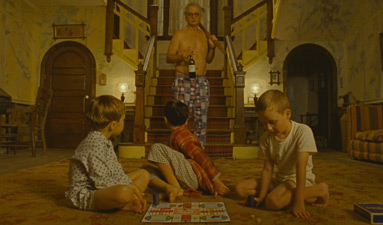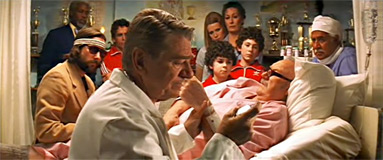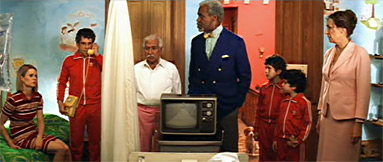[A version of this essay appeared in slightly modified form at The New Inquiry.]
When I was 7, Wes Anderson became my number one enemy. Although Wes Anderson had not yet made any films and I had no sense at all that he would turn out to be such a well-known filmmaker, there was something deeply suspicious and rage-inducing about his name. Those eleven letters, those four syllables, were sinister: more emotionally scarring to me than my humiliation at junior prom, more devastating and Kleenex-sapping than my vulgar and traumatic deflowering by a boy who was more interested in playing Sonic the Hedgehog than paying attention to me. When the words “Wes Anderson” flashed upon my red hot mind, I vowed to hate him to the day I die. I had dreams of influential online magazines publishing my lengthy personal screeds and passing them off as serious criticism. I spent a good deal of my spare time carving Wes Anderson’s name into my arm, and watched the wounds heal into awkward scars. I cursed my poor penmanship. So I would try again. And again. Until I ran out of fresh spots on my body. To this day, there have been awkward conversations with my lovers when they discover my adolescent handiwork. Of course, I blame Wes Anderson for all of this. He is my number one enemy. My hatred for him, rather than the rising sun or the birds pleasantly chirping, is what gets me up every morning.
In junior high school I experienced a great deal of ageism. The kids who were thirteen picked on the kids who were twelve. I was not spared, even when I provided a fake birth certificate which suggested that I had been born one year later. The thirteen year old tyrants would lock you inside a locker if they suspected you of being only a few days shy of the coveted baker’s dozen. To some children that’s a green light for ageist motherfuckerness.
For this, I blame Wes Anderson.
In high school I followed the predictable route from alternative (no longer exists: Wes Anderson’s fault) to vegan nihilist and began to alter my weight to reflect my shifting mood. At one point, I weighed 9,000 pounds. A year later, I had slimmed down to 90 pounds. I continued to starve myself and got down to an unprecedented 15 pounds. Because I wanted them all to know just how fucking serious and how punk rock I really was.
But I didn’t stop there. I had my best friend, my only friend, the friend who eventually got a restraining order against me, wrap me up in cellophane and put me among other steaks at the supermarket. And I talked back to all the evil carnivore sellout tools who dared to pick up a steak for the weekend. And somebody called the store manager. And they escorted me out of the store and forced me to gain 200 pounds.
They all turned out to be Wes Anderson fans.
For this, I blame Wes Anderson.
I started cutting off my fingers to prove how edgy I was, figuring that they would grow back. They didn’t. And I am now dictating this very serious essay into a smartphone manufactured by a multinational corporation that makes me feel special, entitled, unique, independent, the absolute voice of my generation. The loss of my fingers changed the course of my life and, through it, I found the narcissism I desperately needed at the time, that indeed I still need to this very day. There isn’t a second that goes by when I don’t think about what the world owes me and what I am entitled to.
For all this, I blame Wes Anderson.
The punk scene of Chula Vista, California was one of the most important things to happen to me — in large part because the punk scene in question was composed of one person, and one person only: me. This is what happens when you grow up in a place that isn’t San Diego and isn’t Tijuana, a place where the biggest draw is Knott’s Soak City USA and you can’t ride the Coronado Express because you don’t have the fingers to grab onto the handles of the raft. (Those sheep who use the waterslides are all sellouts and tools and are enemies of me because they are friends of Wes Anderson and you should hate them all too.)
Let me put it another way. You spend a lot of time alone with a guitar that you can’t play and a look that you can’t find and a rage that you can’t quit. Something has to give.
I began burning my hair sometime around this time. The constant conflagration flickering above my forehead was a protective and deflecting shield. Of course you don’t like me lady, but it’s because I have the courage to light my hair on fire and you don’t. Try getting outside of your comfort zone with lighter fluid and a match. Try relocating your otherness by burning off your exterior to get to the interior.
While I attracted attention, I still felt alienated. And it wasn’t just because some men in white suits took me away from the fire and locked me inside a quiet room. I’d reluctantly realized I’d been denying a part of myself that hadn’t been devoted to this unmitigated rage towards Wes Anderson. It was still their world. Though the loss of my fingers and the sacrifice of my hair had liberated me, it was still necessary for the whole of me to hate Wes Anderson, to see patterns in his films that were not there. Around this time, The Royal Tenenbaums came out and, with the help of prosthetic fingers, I began destroying every sign printed in Futura lettering. This was not easy. There were many graphic designers at the time who liked using Futura.
For many people (and by “many people,” I mean “me”), feelings of inherent incorrectness in the world will never change without large thinking and an enormous shift in consciousness. I hope that this brave personal essay, which took me almost a decade to live and an hour to write, will encourage you to hate Wes Anderson as much as I do. Wes Anderson has the right idea, but it’s just not right enough for me to stop blaming him for every hard knock I’ve had. It’s just not enough for me to stop despising him.
